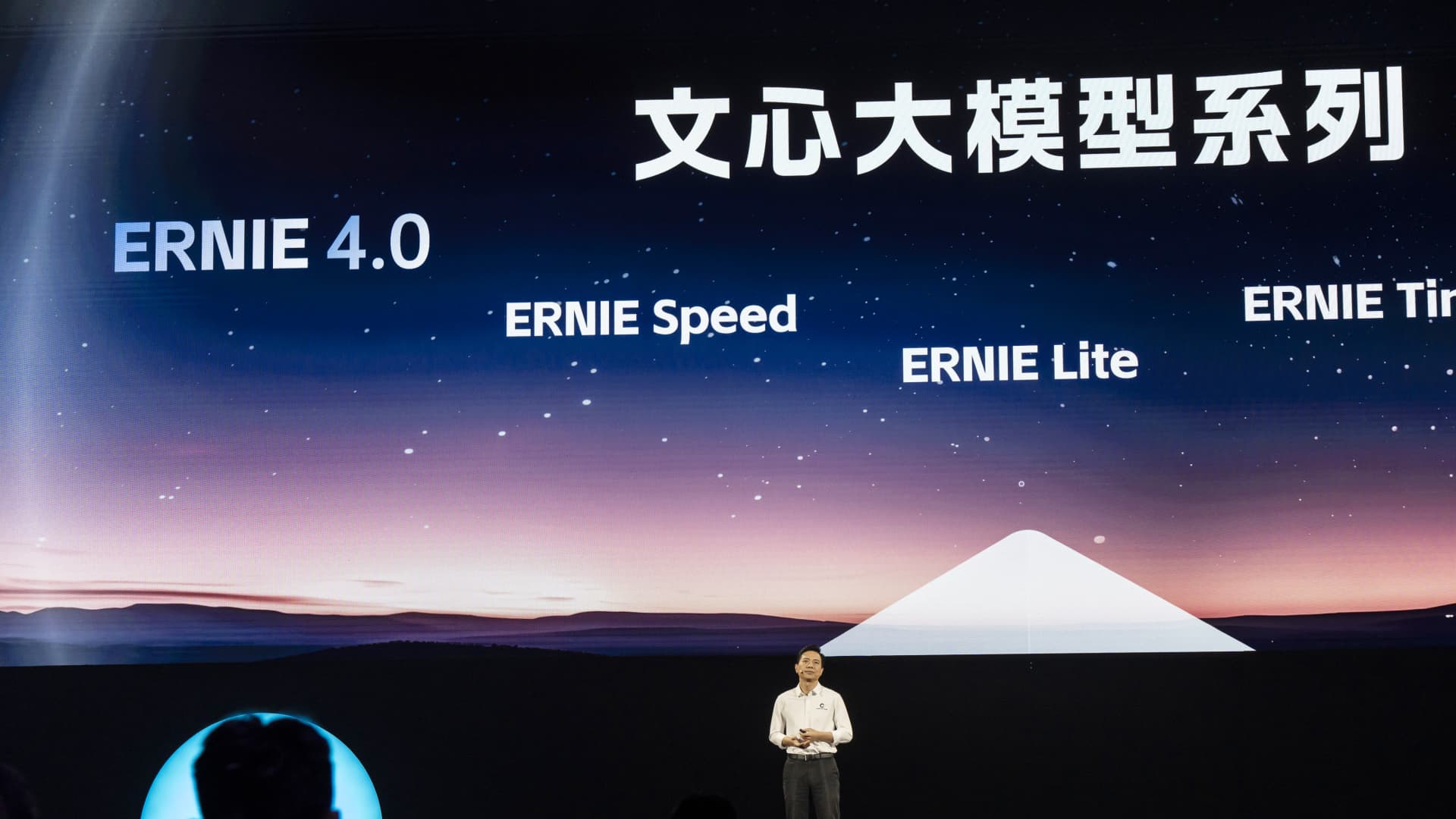

Baidu CEO Robin Li speaks during the company’s Create conference in Shenzhen, China, on April 16, 2024.
Bloomberg | Bloomberg | Getty Images
SHENZHEN, China – One year after Chinese search engine operator Baidu released its ChatGPT-like Ernie bot, the company this week announced tools to encourage locals to develop artificial intelligence applications.
“In China today, there are 1 billion internet users, strong foundation models, sufficient AI application scenarios and the most complete industrial system in the world,” CEO Robin Li said in his opening speech at Baidu’s annual AI developers conference on Tuesday.
“Everyone can be a developer,” he said in Mandarin, according to a CNBC translation.
While many point out how China lags behind the U.S. in artificial intelligence capabilities, others emphasize how the strength of the Chinese market lies more in technological application. Take next-day e-commerce and 30-minute food delivery, for example.
Baidu’s newly announced AI tools allow people with no coding knowledge to create generative AI-powered chatbots for specific functions, which can then be integrated in a website, Baidu search engine results or other online portals. That’s different from a similar tool called GPTs that OpenAI launched earlier this year, since those custom-built chatbots — for everything from suggesting movies to fixing code — sit within the ChatGPT interface.
The basic Baidu tools are generally available to try for free, up until a certain usage limit, similar to some of Google’s cloud and AI functions. OpenAI charges a monthly fee for the latest version of ChatGPT and the ability to use it for computer programs. The older ChatGPT 3.5 model is free to use, but without access to the custom-built GPTs.
Baidu this week also announced three new versions of its Ernie AI model — called “Speed,” “Lite” and “Tiny” — that coders can selectively access, based on the complexity of the task.
“It feels like their focus is on building the entire native AI development ecosystem, providing a full set of development tools and platform solutions,” said Bo Du, managing director at WestSummit Capital Management. That’s according to a CNBC translation of the Chinese remarks.
Baidu said this week that Ernie bot has accumulated more than 200 million users since its launch in March last year, and that computer programs are accessing the underlying AI model 200 million times a day. The company said more than 85,000 business clients have used its AI cloud platform to create 190,000 AI applications.
How the tech is being used
Many of the use cases Baidu showed off this week centered on consumer-facing applications: tourism and creation of content such as picture books and scheduling meetings.
In a demonstration hall, Baidu business departments showed off how the AI tools could be integrated with virtual people doing livestreams, or directing search engine traffic to an AI-based interactive buying guide.
Buysmart.AI, which won Baidu’s AI competition last year, uses the tech for an online shopping assistant connected to Chinese social media platform Weibo. The startup said it is using ChatGPT for a standalone interactive e-commerce app in the U.S.
“Personally I think that Ernie 4.0 has a better grasp of Chinese than ChatGPT 3.5,” Buysmart.AI co-founder Andy Qiu said in an interview. That’s according to a CNBC translation of his Mandarin-language remarks.
Consumers in the U.S. are currently more interested in AI products than users in China are, Qiu said. But he said that overall there is still room for improvement when it comes to building consumers’ trust of AI assistants and convincing users to place an order.
Also on display was a humanoid robot developed by Shenzhen-based UBTech Robotics that used Baidu’s Ernie AI model for understanding commands and reading written words.
It’s not immediately clear how such AI applications can significantly change business at this point. But Baidu is the latest to roll out more tools for people to experiment more easily and cheaply with.
Customer service, voice assistants and internet-connected devices can use smaller AI models to respond quickly to users, pointed out Helen Chai, managing director at CIC Consulting.
She added that in scenarios such as legal consultation or medical diagnosis, small AI models can be trained on specific data to achieve performance that’s comparable to larger AI models.
In the future, big AI-based applications will be based on a mixture of models, Baidu CEO Li said, using the technical term of “mixture of experts” or MoE.
He also promoted Baidu’s capabilities in AI-produced code, one of the areas in which Silicon Valley tech companies see the most potential for generative AI.
Baidu said since it deployed its “Comate” AI coding assistant a year ago, the tool has contributed to 27% of the tech company’s newly generated code. Audio streaming app Ximalaya, IT services company iSoftStone and Shanghai Mitsubishi Elevator are among more than 10,000 corporate Comate users, and have adopted nearly half of the code the tool generates, according to Baidu.
The global rush for developing generative AI has created a shortage in the semiconductors needed to provide the computing power. Chinese companies face added constraints due to U.S. restrictions on chip exports.
Baidu did not specifically discuss a shortage in computing power during the main conference session. In his speech, Dou Shen, head of AI cloud at Baidu, noted “uncertainties” in the chip supply chain and announced that Baidu has a platform that can access the power of several different kinds of chips.
Back in February, Li said on an earnings call that Baidu’s AI chip reserve “enables us to continue enhancing Ernie for the next one or two years.” The company is set to release first-quarter results on May 16.




